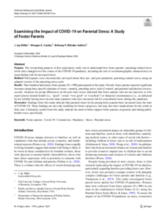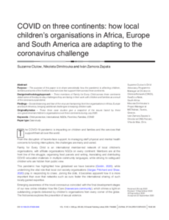This page contains documents and other resources related to children's care in the Americas. Browse resources by region, country, or category.
Displaying 251 - 260 of 1438
The present study examined how emotional abuse and emotional neglect-exposure in adolescence uniquely related to psychological symptoms and social impairment.
This paper documents the alignment between the circumstances created by anti-Black racism at institutional, provincial, and federal levels and the seemingly race-neutral eligibility criteria embedded within Ontario child welfare, which results in disproportionate reporting of Black families.
The overarching purpose of this exploratory study was to understand how foster parents’ parenting-related stress levels have changed over the course of the COVID-19 pandemic, including the role of sociodemographic characteristics in exacerbating risk for increased stress.
The current study is the first to explore the prevalence of reproductive coercion among adolescent women currently or previously involved in the U.S. foster care system.
This paper examines the ways in which anti-oppression and anti-racism perspectives can be included as an aspect of Child and Youth Care (CYC) thought and practice, with particular relevance to service provision for African Canadian families.
This study sought to determine whether home environments with higher levels of emotional support and cognitive stimulation predict later academic achievement and whether this relationship is moderated by placement type (i.e. biological/adoptive parent care, kinship care, or non-kinship foster care). This study included 1,206 children from the second U.S. National Survey of Child and Adolescent Well-Being (NSCAW-II) who were involved with Child Protective Services (CPS) between 2–7 years of age.
This study analyzed 10 years of federal child welfare data to understand the effect of foster care placement, provider, and support factors for children in foster care due to parental substance use disorder.
This study used the 2000–2017 waves of the Adoption and Foster Care Analysis and Reporting Systems. The authors identified foster care entries among children removed from their homes because of parental drug use (PDU) and calculated the number of entries for each year. They also identified foster care discharges achieved through parental reunification among children removed from their homes each year.
This paper presents key findings from the 2018 cycle of the OIS (OIS-2018) and highlights select policy and practice implications of these findings.
The purpose of this paper is to share anecdotally how the pandemic is affecting children, families and some of the frontline local services that support them across three continents.



